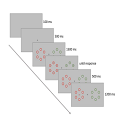Abstract
Loss aversion is a psychological bias where an increase in loss is perceived as being larger than an equivalent increase in gain. In the present study, two experiments were conducted to explore whether attentional control reflects loss aversion. Participants performed a visual search task. On each trial, a red target and a green target were presented simultaneously, and participants were free to search for either one. Participants always gained points when they searched for a gain color target (e.g., red). However, they gained or lost points when they searched for a gain-loss color target (e.g., green). In Experiment 1, the expected values of the gain color and the gain-loss color were equal. Therefore, for maximizing the reward, participants did not need to preferably search for a particular color. However, results showed that participants searched for the gain color target more than the gain-loss color target, suggesting stronger attentional control for the gain color than the gain-loss color. In Experiment 2, even though the expected value of the gain-loss color was greater than that of the gain color, attention was allocated to the gain color more than to the gain-loss color. The results imply that attentional control can operate in accordance with the loss aversion principle when the boundary conditions for loss aversion in a repeated binary decision-making task were met.
